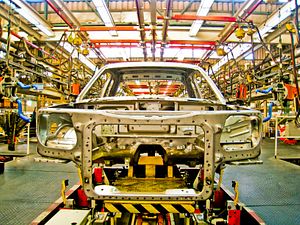After nervously sitting on the sidelines as Thailand’s military instigated a coup last week and the country experienced a political meltdown, Japanese investors (particularly auto manufacturers) are looking to resume operations and continue investment. This is a noticeable change of heart from as recently as the end of April.
On April 30 in the Wall Street Journal, Honda said it was delaying by at least six months the construction of a $530 million assembly plant in Thailand. The chief operating officer of Honda Automotive Thailand Co., Pitak Pruittisarikorn, said the delay was due to an overall decline in auto sales, and because of “political uncertainty and the fact that we don’t know when it’s going to end.”
Auto analysts cited in the article said the decline in domestic demand had affected the industry up the supply chain. Many other car manufacturers, including Toyota, had warned of falling sales and trepidation because of an end to a government stimulus plan for first-time car buyers. Amata Corp, an industrial park developer, was also quoted as saying that several land purchases had been put on hold.
In contrast to this, the AFP quoted Honda chairman Fumihiko Ike on Tuesday at the Japan Automobile Manufacturers Association saying, “Thailand is where companies can invest with security. I personally don’t think there are huge risks to the economy.” Toyota’s executive vice president Nobuyori Kodaira said that while the company would keep a keep a close watch on political developments, the country remained a “very important base for us.”
Indeed, despite the auto industry’s vocal fears about political instability last month, and the delay to both new production plants and land acquisitions, not much appears to have changed, even at the height of uncertainty last week. The AFP article noted that Honda only cancelled one shift following the coup, while Toyota shut down briefly on Thursday and Nissan never missed a beat. While Honda acknowledged that it was cutting production at its Thai plant by 40 percent, it said the change was not due to political instability, but rather a drop in demand.
Japanese automakers optimism is likely due to the fact that the new ruling Thai military leaders have made stabilizing the economy a key issue. While no election timeline has been issued, a separate WSJ article stated that de facto ruler General Prayuth Chan-ocha had met Sunday with Japanese businesses “to reassure them that the new military regime will attempt to shift the economy into a higher gear.” He is also considering new stimulus measures and will attempt to free up government spending that had been suspended in the political turmoil.
It appears that Japanese automakers are prepared to take the new military junta at its word. Indeed they may have little choice. As Japanese companies moved critical parts of their supply chain to Thailand because of the strong yen and cheap labor, they cannot afford to slow down production for long.
































